Why Babies & Toddlers Hate Vegetables (and what to do about it!)
This post might be a rude awakening for some parents and it’s not meant to be a slap in the face, but I think it’s important to share the truth about foods that are marketed towards babies and toddlers. Especially since eating a processed food diet is the #1 reason why kids don’t like vegetables.
When my daughter started eating solid food, I didn’t buy any jarred baby food. I never bought a single jar of pureed peas, pureed bananas – or any of those other jars of pureed baby food. I also didn’t blend up pureed fruits and veggies at home to make my own homemade “baby food”.
When I tell some people that, I can tell they are confused and wonder what in the world I fed my daughter when she first started on solids.
There is an entire industry dedicated to selling jarred and pureed baby food and parents are led to believe that this is what you are supposed to buy for your baby (unless you make homemade pureed foods). Yet in my experience, babies can start with small soft finger foods and become eaters on their own.
Letting a baby feed themselves after the age of 6 months is called Baby-Led Weaning, and this has worked amazingly for Harley.
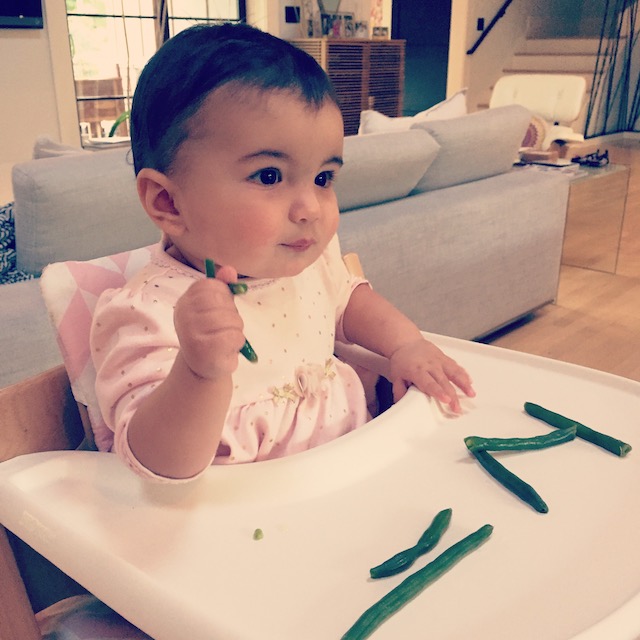
Harley eating green beans for the first time
Jarred baby food is not the same as real food.
My Advisory Council member, Dr. Jonathan Aviv, studied the ingredients and composition of jarred baby food and discovered that even organic versions are surprisingly acidic compared to whole foods. For instance – a jar of banana baby food contains the additives “citric acid” and “ascorbic acid”, which can turn the entire jar of food acidic About 100 times more acidic than a regular banana! This increased acidity can have an effect on the digestion of food and give your baby acid reflux.
Jarred banana baby food is not the same as a mashed banana.
Dr. Aviv says if you see the ingredients “citric acid” or “ascorbic acid” to be wary, as it can turn the entire contents of the food acidic.
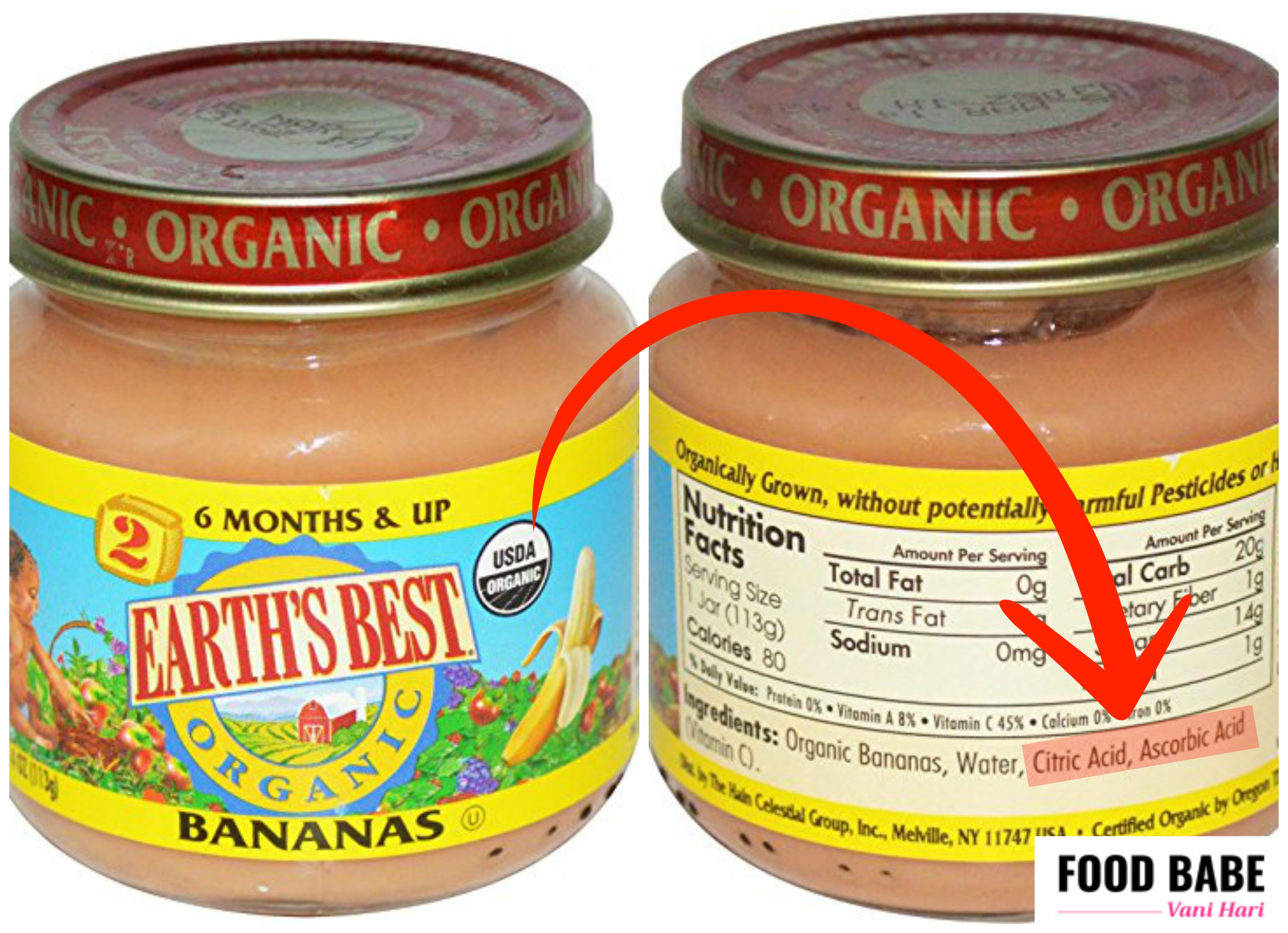
The industry goes on to perpetuate the idea that babies “graduate” from purees onto finger foods with a whole new line of more processed foods for toddlers…
You’ve got Pasta Pick-ups, Lil’ Crunchies, Arrowroot Cookies, and Lil’ Meat Sticks. With these products, the industry is helping put young children on the processed food bandwagon so that it only seems natural to them to eat food from box, bag, or jar. This is the stage that my daughter is at now – and just like I never bought her jarred baby food – I don’t buy these products either. When she sees me or her Dada pick up anything processed, she’s curious and wants a bite too – this is more motivation not to eat processed foods in front of her and keep the junk out of our house.
The ingredient list on most store-bought toddler food is despicable. Especially Gerber Graduates line…
I was pretty shocked looking at the number of ingredients on the back of this package of this Gerber toddler food…and even more shocked Gerber is allowed to produce food for small children with hidden MSG that stimulates your taste buds to the point of addiction – not to mention the mysterious “flavoring” which could mean anything and the carrageenan linked to digestive issues. Sheesh!
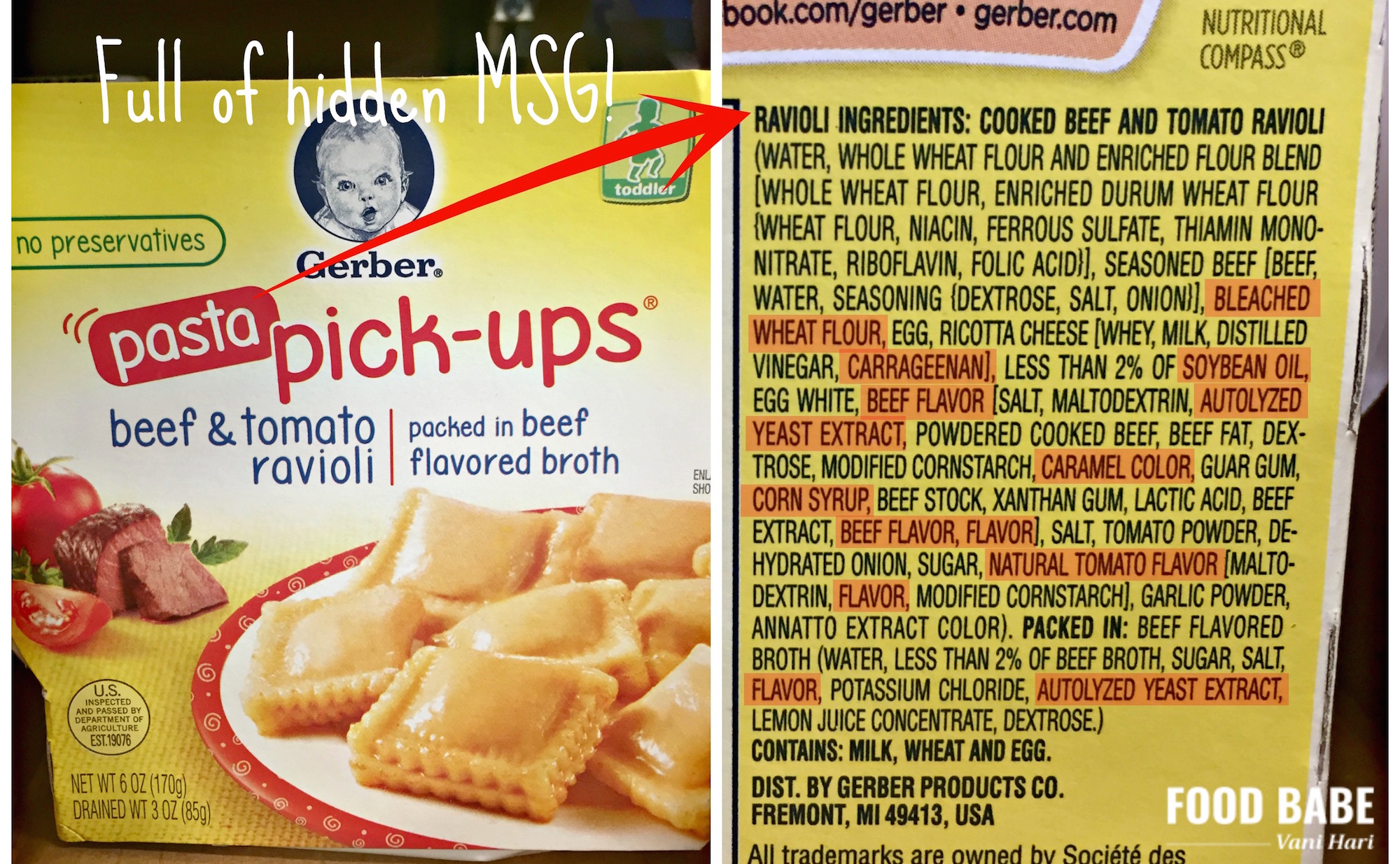
Instead of the additive monosodium glutamate (MSG), the food industry sneaks in other additives – such as “autolyzed yeast extract” and “torula yeast” which contain free glutamic acid – the main component of MSG that makes food addicting. This is a super shady trick by the food industry that allows them to use MSG right under our noses and get us hooked on processed food.
Gerber loves to get our kids hooked on MSG and added flavors from a young age…
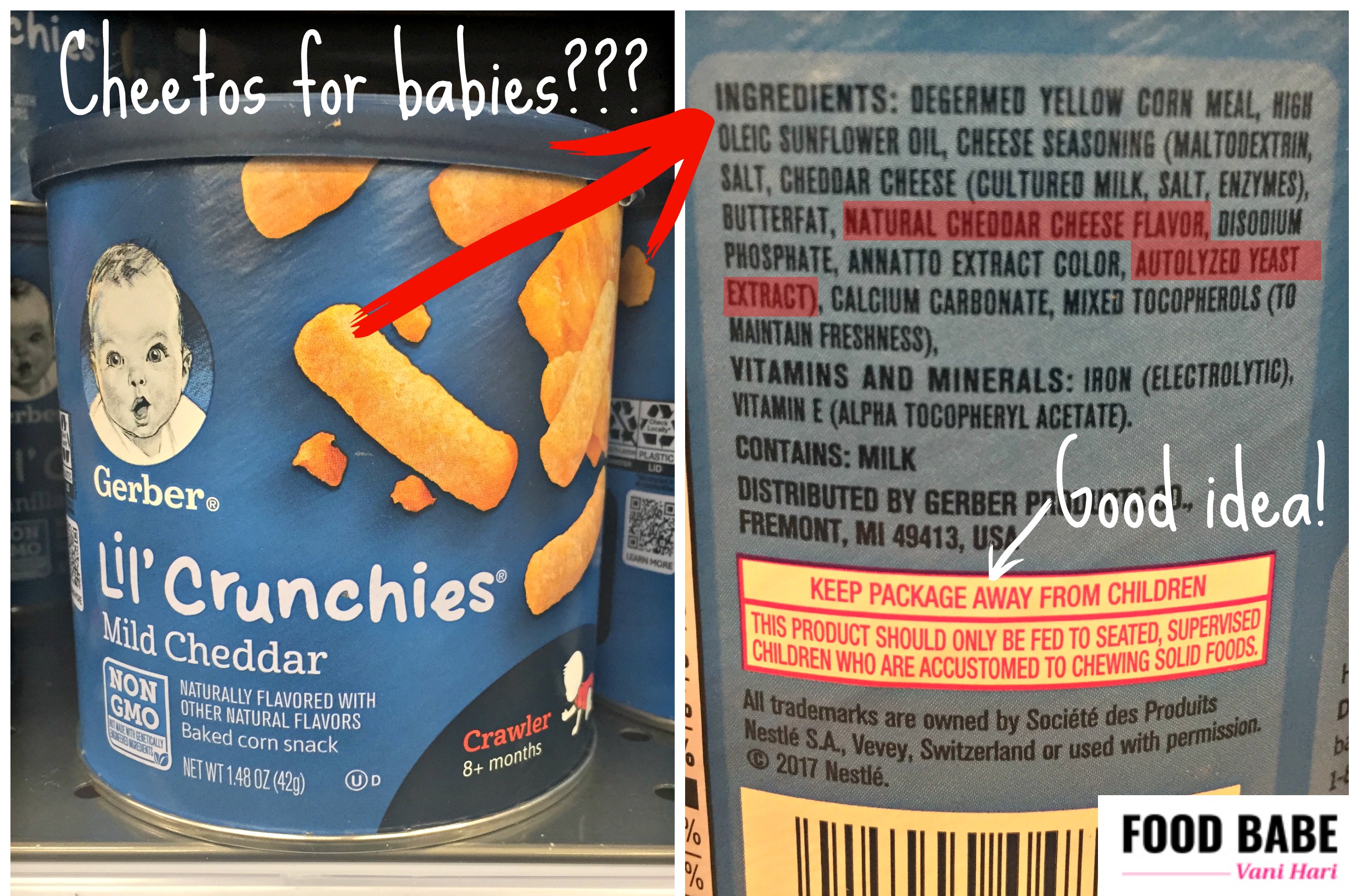
These Gerber Lil’ Crunchies are nothing more than Cheetos for babies. They seriously have almost identical ingredients to Cheetos. Instead of using monosodium glutamate in Cheetos, they sneakily use “Autolyzed Yeast Extract”. This is one of the most infuriating products out there. I’d take heed of that warning to “Keep Package Away From Children” a bit further and run… run far away from these products.
Gerber even adds MSG-like additives to their “seasoned” veggies…
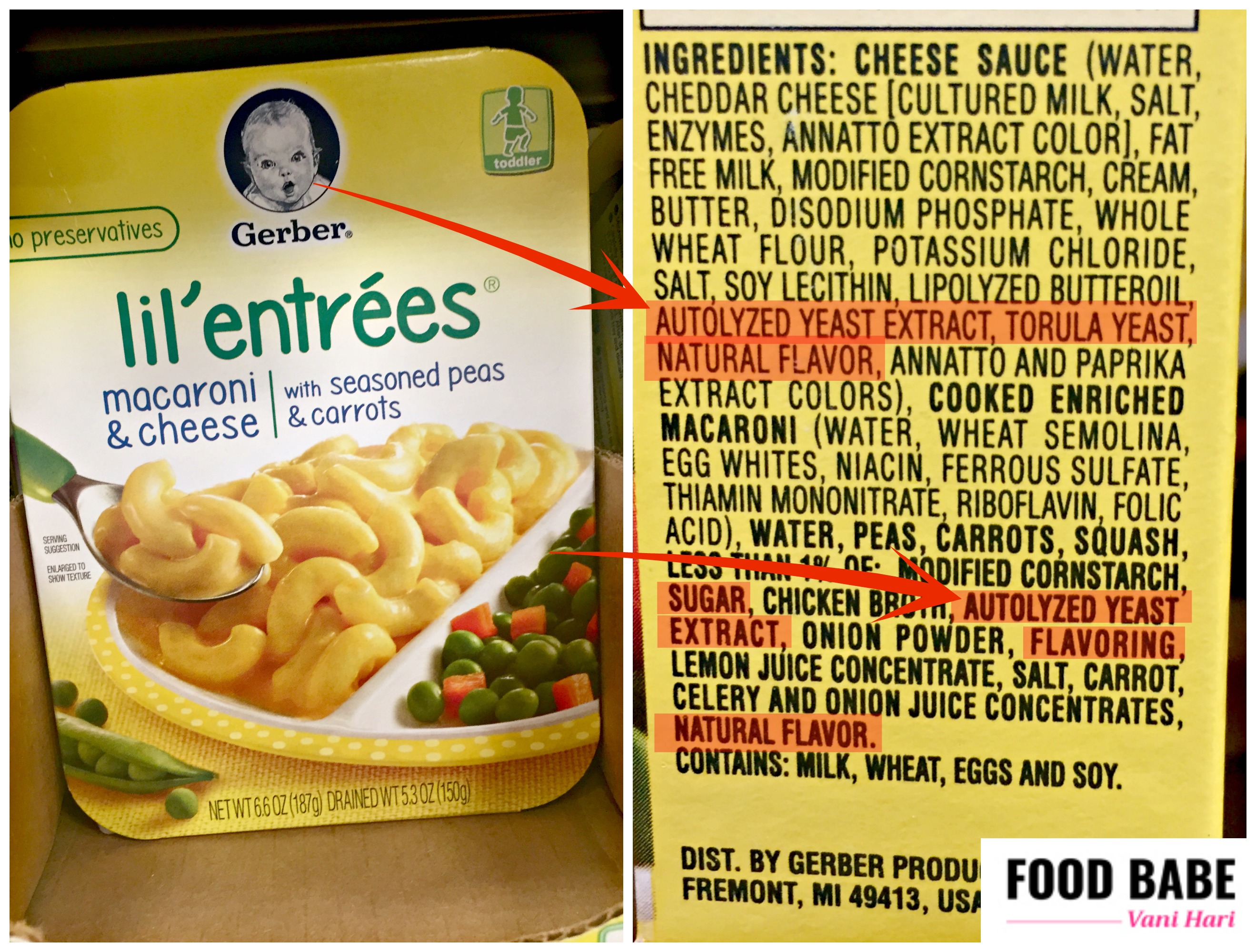
I’m not the only one appalled. A reader sent me this note about Gerber ‘Lil Sticks:
“I found this while grocery shopping for my baby. This was in the baby aisle and can not possibly be healthy. I can’t wait to see what your investigations turn up with baby products… What is Gerber trying to feed our kids?”
Yep… just more MSG-like additives, flavors, and sugar added to conventional processed meat. Yikes. Gerber should be ashamed.
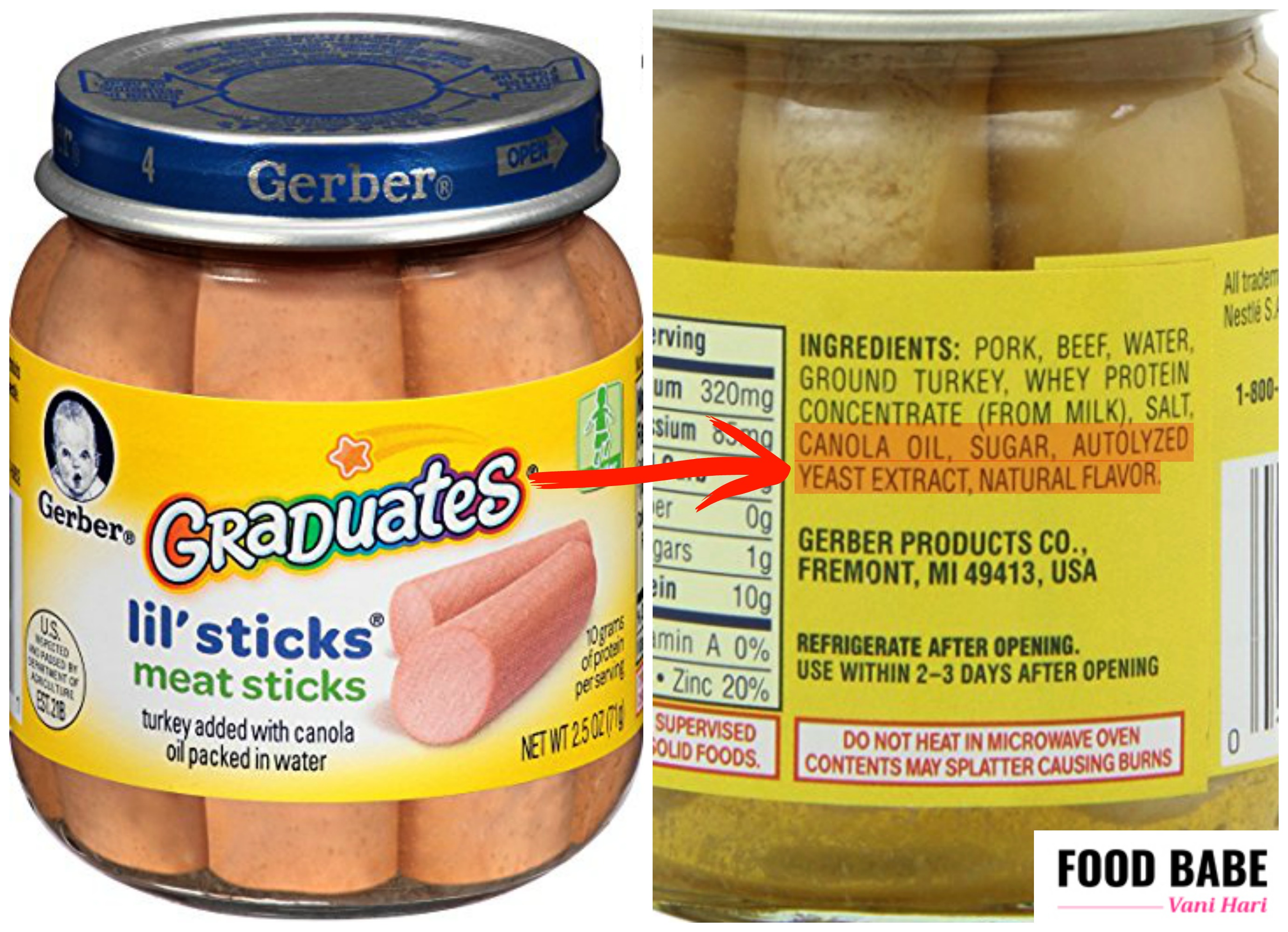
It’s no wonder kids don’t like vegetables. Their taste buds are being hijacked at every meal!
Babies and toddlers can be exposed to a wide variety of vegetables from a young age without having to resort to help from processed food. This isn’t just common sense, it’s backed by science too. Researchers from the University of Colorado School of Medicine found that a big reason kids don’t seem to like green vegetables is because they are not nurtured to like the flavor and bitterness of them from a young age. While babies naturally love sweets, they need to be exposed to dark green vegetables on a regular basis to learn to love them. The researchers further found that a major contributor to the problem was all of these prepared baby foods out there that don’t prominently contain vegetables. Out of 548 foods they found only 52 of them were single-vegetable products and NONE of them were dark green vegetables.
It’s best to start introducing vegetables right when they begin eating solids, as babies between 4-7 months are the most receptive to new tastes. When very young children eat processed baby and toddler foods they are reinforcing a love for sweet and heavily processed foods instead of for the healthiest foods on our planet… vegetables. And, I can speak from some experience. I’ve been giving Harley vegetables at nearly every meal since the beginning and she already really loves just about every single one… she even picks the kale out of her pasta and eats it before anything else.
Are Squeezy packs healthy?
A lot of parents love squeezy packs, and I can see why. They are super convenient to travel with, don’t require a spoon, kids love them, have simple ingredient lists, and are easy to find organic. That being said, I don’t buy them for Harley.
From a very young age, children develop habits and start to form opinions about food. Think about this… squeezing pureed pear into your mouth from a sanitary pouch with a spout is nothing like picking up pieces of fresh pear and putting them in your mouth. When you eat real pears, you can see it. You can feel the juicy texture in your fingers and smell it. This helps you to learn more about what you are eating and learn to love real food (versus food that comes in a shiny package with a cartoon character on it). When they see pears in the grocery store, they will start to associate them with the real pears they have been eating at home. If they’ve been sucking pears through a pouch, it’s unlikely they’ll make that connection. Offering real whole foods (whenever possible) is how you help foster healthy eating habits for life.
There are more reasons to stop buying squeezy pouches…
- These products typically contain less fiber and more sugar than whole foods meaning they have an increased ability to spike blood sugar in the body.
- Some pouches have added sugar in the form of “fruit juice concentrate”, making the fruit in the pouch sweeter than the real thing.
- They could be highly acidic, just like jarred baby foods when they have citric acid and ascorbic acid added to them.
- If they are preserved with lemon juice or citric acid, this could be harmful to teeth when sucked from a pouch and allowed to sit on the teeth for an extended period.
- Toddlers are developing their fine motor skills, including how to hold food, bring it to their mouths and chew it. These pouches totally bypass the chewing process.
Quite simply, even if the ingredients are simple, these are not the same as eating real food and not something I would rely on a regular basis.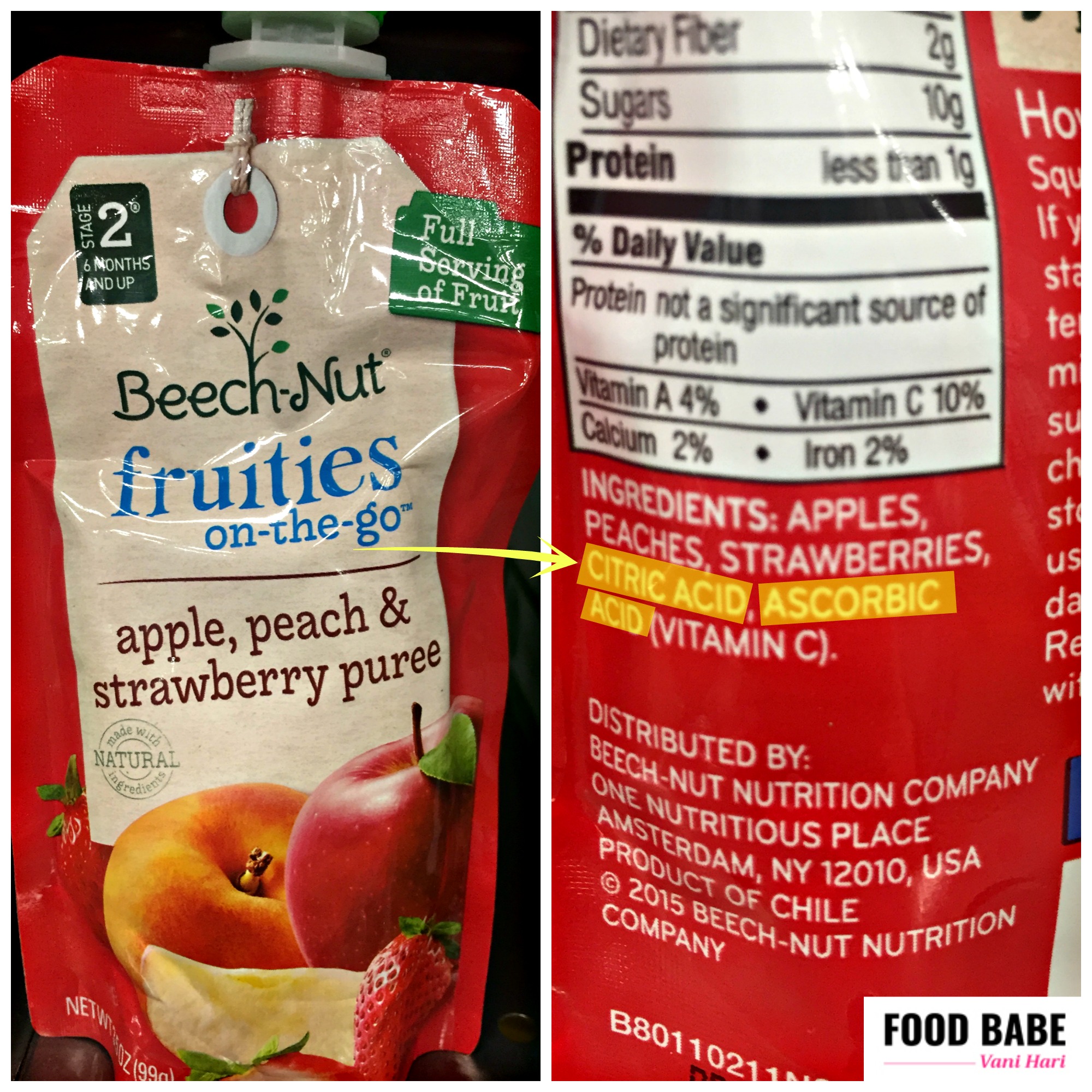
And, then there’s all that added refined sugar in toddler snacks…
What is “added refined sugar”? This is processed sugar that is added to a product that isn’t part of a whole food (So, it wouldn’t include the sugar naturally found in a whole banana, for instance). Here are some common examples of added refined sugar you may see on an ingredient list:
- Sugar
- Cane Sugar
- High Fructose Corn Syrup
- Corn Syrup
- Brown Rice Syrup
- Invert Sugar
- Fruit Juice Concentrate
You may have heard the guidelines that say that adults are supposed to eat fewer than 25 grams of added sugar per day for good health. Well, it’s even more strict for young children. In fact, it’s recommended that toddlers under the age of two not eat ANY added sugar per day, and that the only “sugar” in their diet should include those naturally found in whole foods.
Yet, the processed food industry doesn’t care – they still add refined sugar to virtually everything. Almost all of the store-bought toddler snacks out there have added refined sugar… even organic ones!
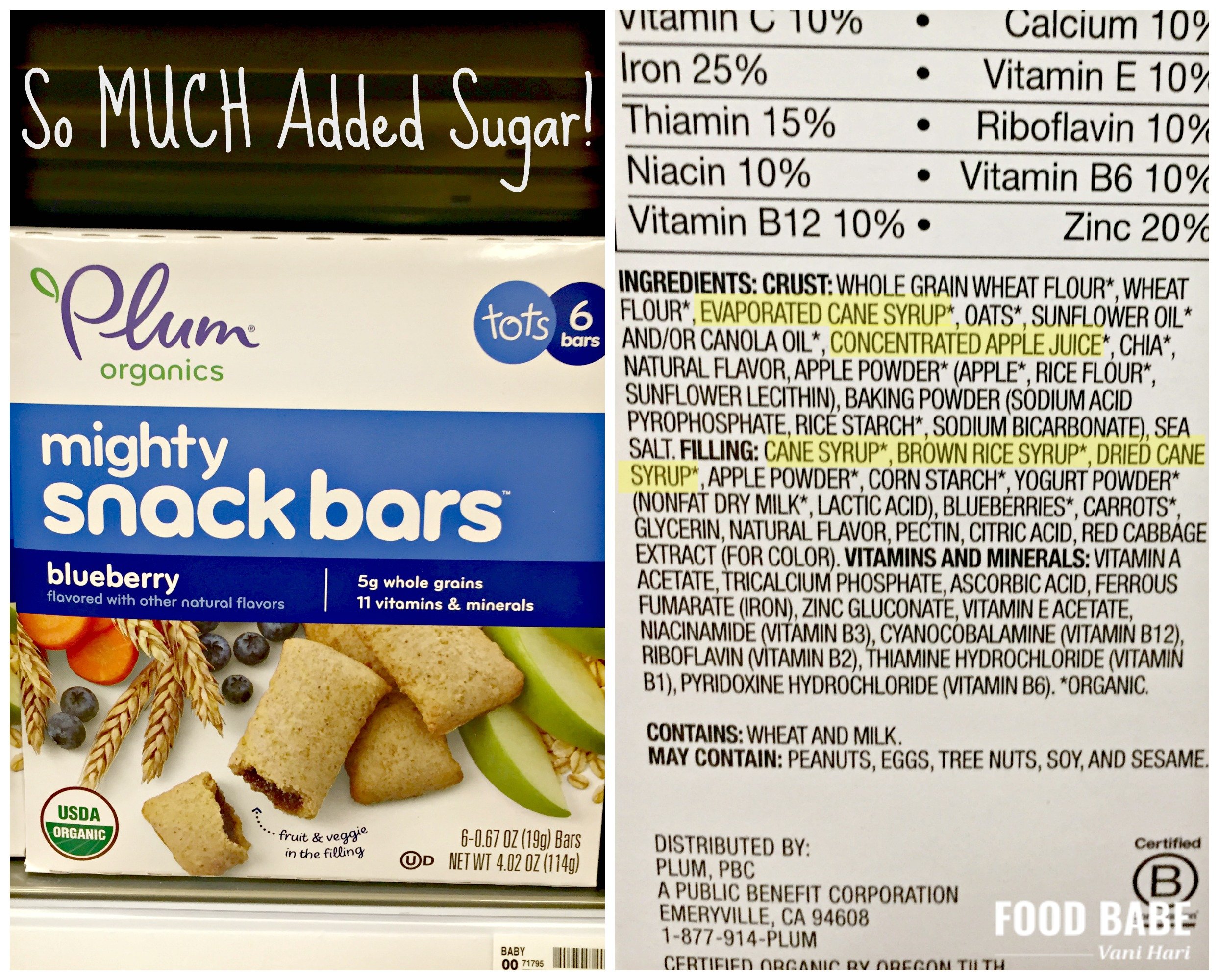
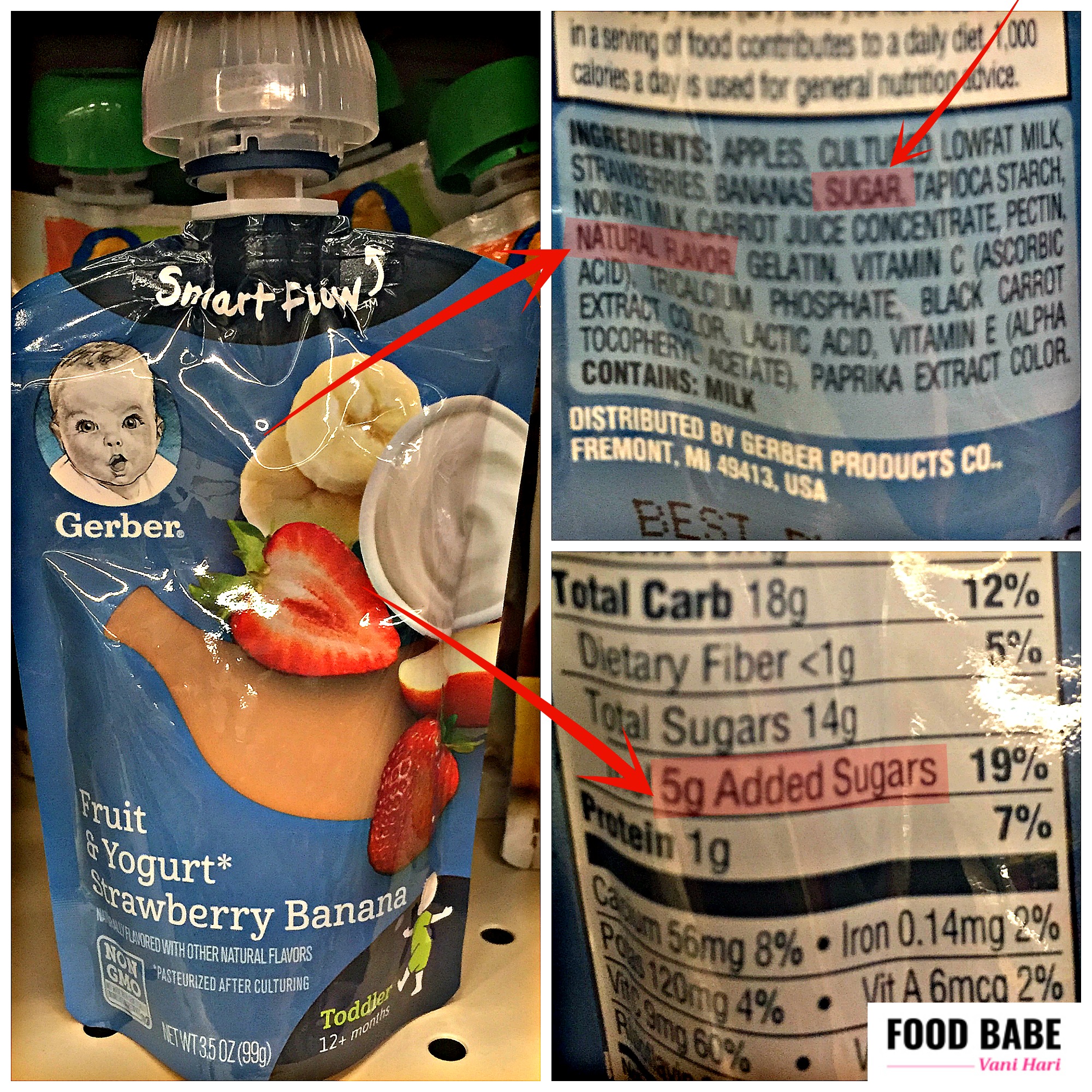
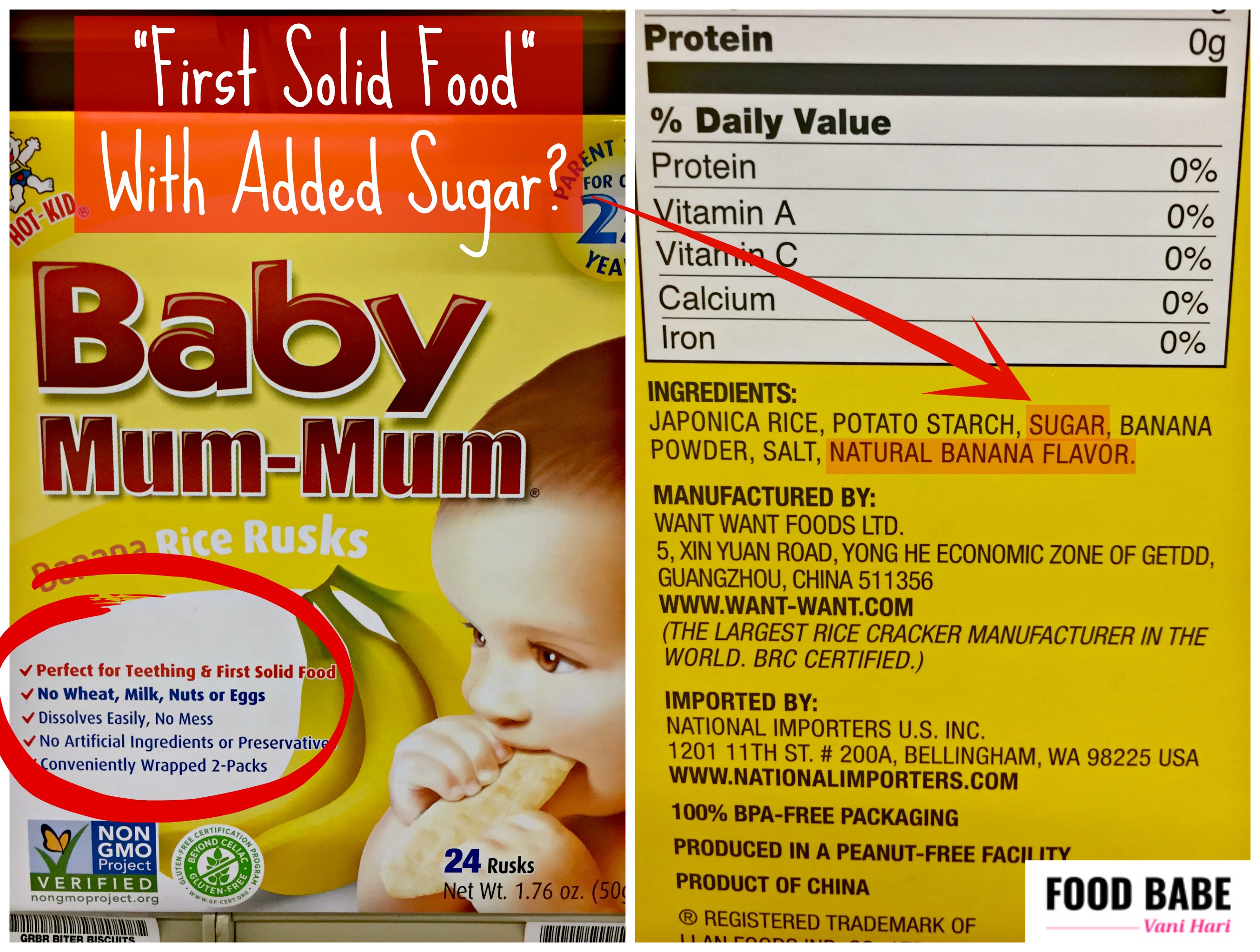
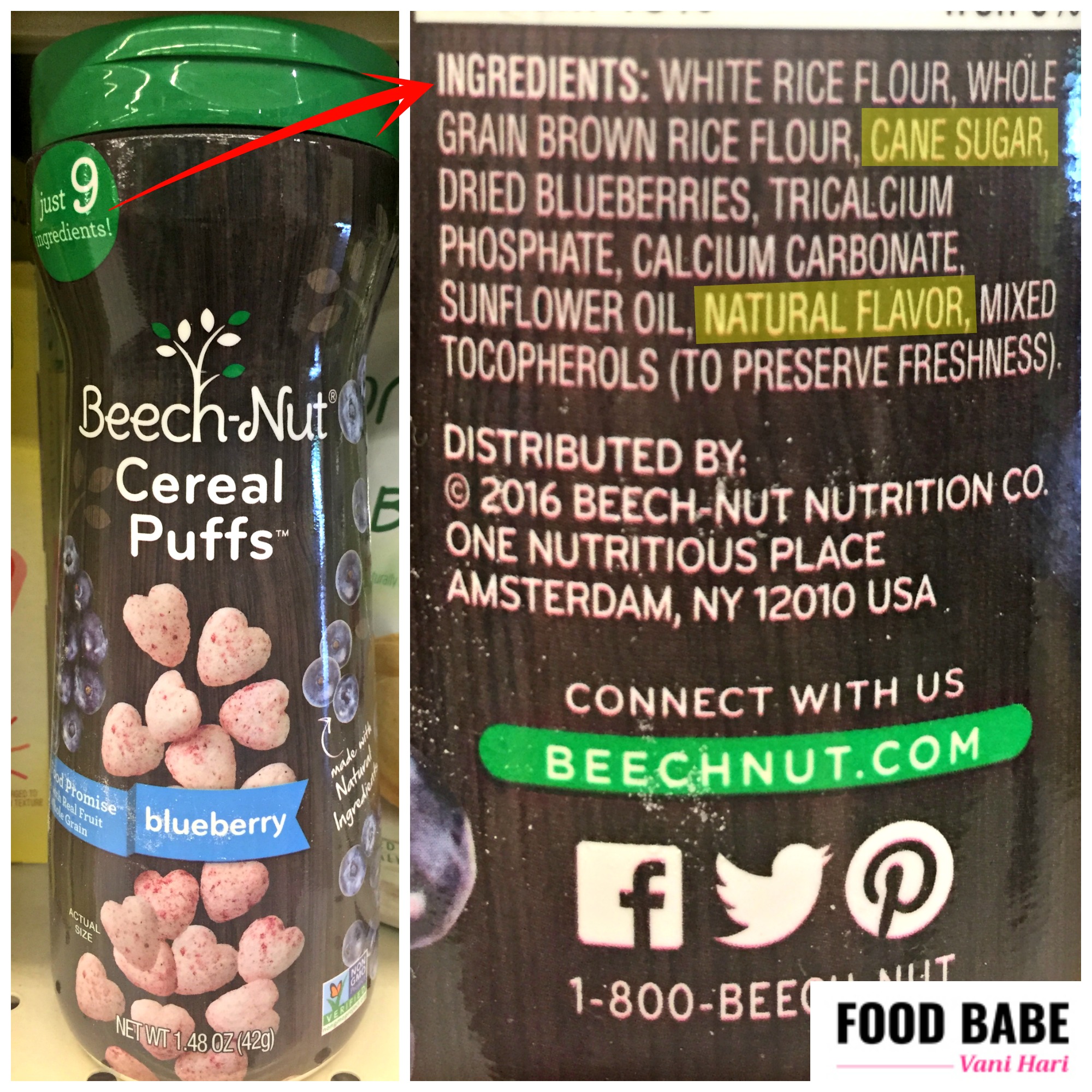
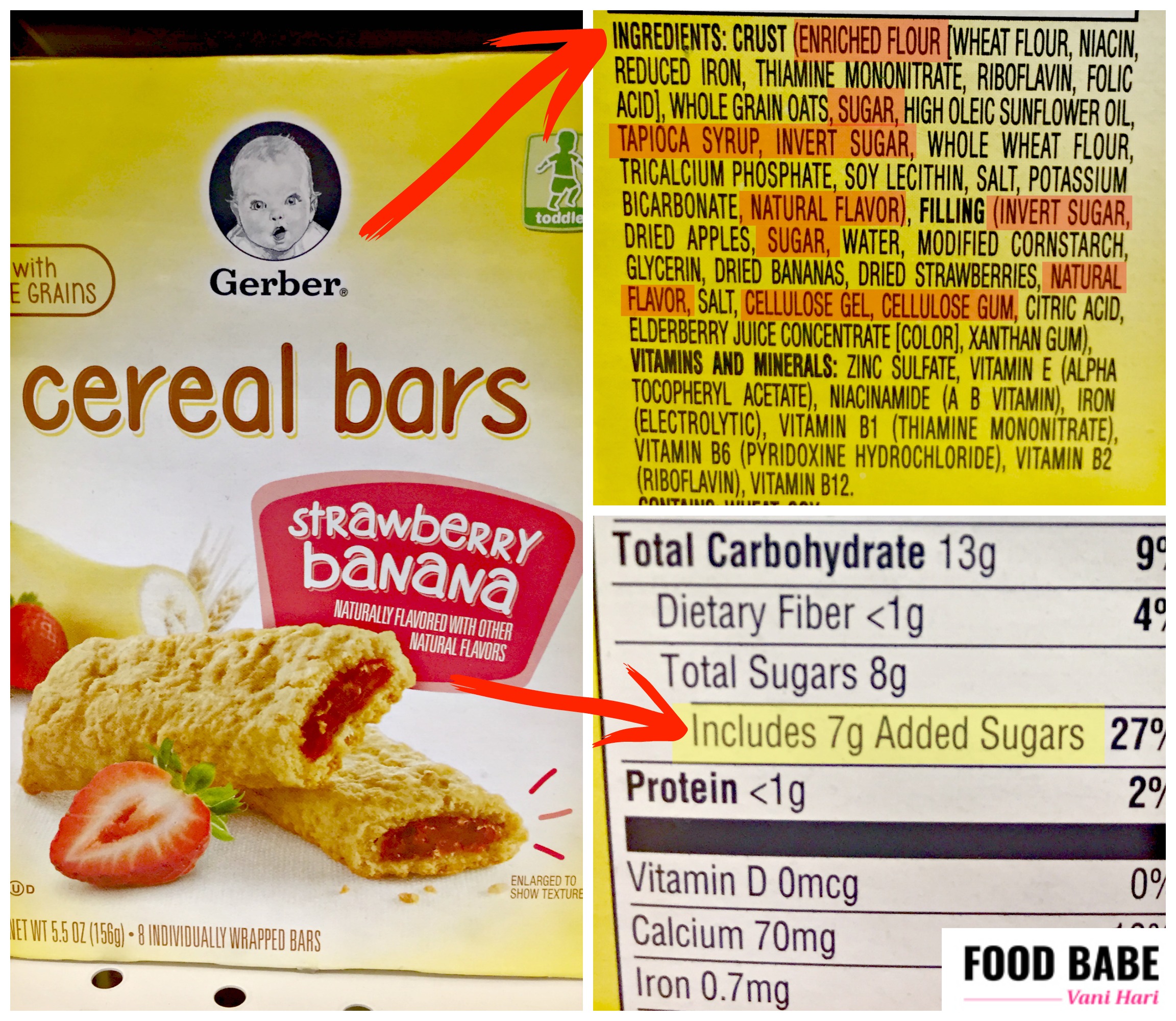
What’s a parent to do? Thankfully, there are healthier store-bought baby and toddler foods to choose from…
Of course I always preach the gospel of eating mostly homemade, whole foods – and it’s no different when feeding my baby or toddler. But, ever since Harley was born I’ve been getting lots of baby food questions from other new parents out there looking for healthy store-bought options:
“Hi Vani, My name is Tania and I am a first time mom of a beautiful 14 month old girl. Until now she has been enjoying her breast milk and solid foods 3x a day, but as she is getting older and we spend more time outdoors and with other kids, she has gotten really interested on snacking 😕 as she sees all the other kids with Cheerios and cookies… I honestly want to stay away from giving her snacks, but at the same time I want to be able to have options. It is beyond sad to see organic and non-gmo kids food brands to have “natural flavors” to their puffs, bars, etc. Therefore, I wanted to ask you (as a first time mom yourself to such a beautiful baby girl) if you have any recipes for such things or if you have discovered any store brands that you would feel comfortable giving to your daughter! Also, do you use any Food storage containers to keep her baby food warm other than what you shared on a recent post you had? Your help, as always, is greatly appreciated.” ~ Tania
“I was wondering if you had any information about food choices in general for toddler diets (brand to avoid and which ones you recommend)… Any and all info on what to feed our kids would be awesome. Reality is we can’t always travel and be on the go with fresh foods and time is truly a barrier to making my own food for my child. Thank you for everything you do!” ~ Amanda
Thankfully, there are some packaged options that are a better choice and are more convenient than making everything from scratch yourself. And, there are some processed foods that I buy for Harley on occasion. Here are some good options I like:
What do you do when your daycare ONLY allows packaged food (not homemade)?
“My daughter will be going to daycare come September and the daycare she will be attending provides the AM/PM snack. This would be great, however the snacks they provide include cheerios, goldfish, nilla wafers, pretzels, etc. I do not want my daughter eating processed snacks on a daily basis, and I am hoping I can send in my own snacks. However, I don’t want her to feel like she will be missing out. I was hoping you could recommend some alternatives to the snacks listed above that would be better for her but appear similar so she wouldn’t know the difference (she is only 15 months)? Thanks in advance.” ~ Alicia
Whole real fruit should always be an option at day cares and if it’s not, I would lobby the management to start allowing it. But, if you’ve got no other option than packaged food, give these a try (but don’t rely on them on a regular basis when at home and have the choice):
I shared a recipe for healthy Mini Muffins with vegetables that Harley absolutely LOVES. They are so quick to make and stash in the freezer for snacks… it’s almost as easy as processed food! Get the recipe for Harley’s Mini Muffins here.
I hope this helps you find better choices to feed your little ones healthy foods, which will set them up for a lifetime of loving real whole food (instead of heavily processed products in a can, bag, or box). If you know anyone who has a baby, toddler, or is expecting… please share this post with them. Next up – I’ll share what Harley eats in a day, so stay tuned and be sure to subscribe to my FREE newsletter below.
Xo,
Vani
Posts may contain affiliate, sponsorship and/or partnership links for products Food Babe has approved and researched herself. If you purchase a product through an affiliate, sponsorship or partnership link, your cost will be the same (or at a discount if a special code is offered) and Food Babe will benefit from the purchase. Your support is crucial because it helps fund this blog and helps us continue to spread the word. Thank you.
from Food Babe https://ift.tt/2POfF4D
Comments
Post a Comment